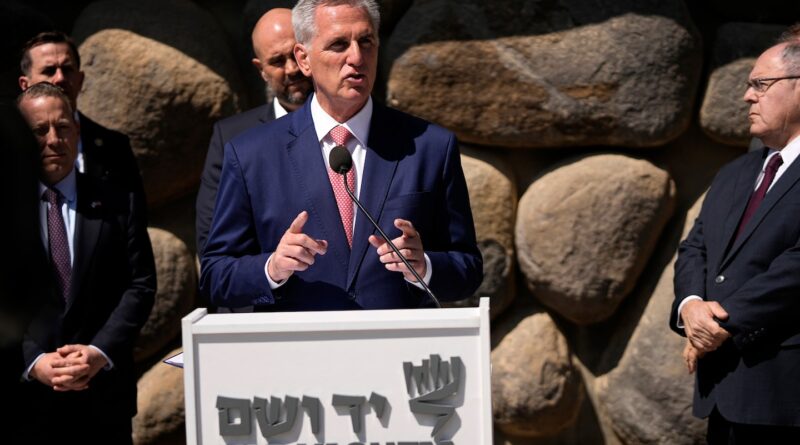McCarthy invites Netanyahu to visit Congress, skip the White House
“It’s been too long,” McCarthy said in an interview with the daily Israel Hayom. “If that doesn’t happen, I’ll invite the prime minister to come meet with the House. He’s a dear friend.” Netanyahu’s office did not immediately respond to a request for comment on McCarthy’s suggestion.
Biden has said he had no immediate plans to offer the traditional visit of a new Israeli prime minister to the Oval Office — Netanyahu returned to power in January — a seeming rebuke for his new government’s controversial push to gain greater control over the country’s Supreme Court. In Washington, Biden and McCarthy are jockeying over the fight to increase the government’s debt limit, with the president refusing to negotiate spending cuts demanded by House Republicans.
McCarthy, saying Netanyahu was in good company, complained that Biden was also stiffing House Republicans. “President Biden hasn’t talked to me about the debt ceiling for the last 80 some days or so.”
McCarthy didn’t address the proposed judicial overhaul in Israel, which many Republicans have characterized as an internal political dispute.
On Monday, McCarthy was scheduled to become just the second U.S. speaker to address a full session of the Knesset, Israel’s parliament, and the first since his fellow Republican Newt Gingrich appeared here in 1998. It is McCarthy’s first foreign trip as speaker and began with a stop in Jordan.
His appearance comes amid one of the greatest political upheavals in Israel’s history, with regular mass demonstrations continuing against the new right-wing government’s fast-track bid to remake the judiciary system.
Supporters see the proposal — which would give lawmakers more control of the makeup of the court, among other changes — as a needed corrective to a judiciary they say has usurped legislative authority and is hopelessly biased toward Israel’s leftist elite. Critics call it a power grab that would gut the balance of power and set the country on a path to authoritarianism.
Biden, saying such a fundamental change should only be made with broad consensus, called Netanyahu directly to express his concerns. The spat went public in March after Biden said that Netanyahu’s government “cannot continue down this road.”
The prime minister snapped back in a tweet, that Israel “makes its decisions by the will of its people and not based on pressures from abroad, including from the best of friends.”
Netanyahu pulled the proposal for further negotiations after protests and a general strike paralyzed the country last month. Talks with opposition lawmakers, overseen by Israeli President Isaac Herzog, have been ongoing over the Knesset’s Passover recess, which ended Sunday.
Netanyahu is struggling to gain agreement over how to proceed even within his own governing coalition, according to reports in Israeli media, and lawmakers are considered likely to take up pressing budgetary measures before returning to the judiciary.
McCarthy’s suggestion that Netanyahu visit the Republican-controlled Congress rather than the White House harked back to earlier tensions between the prime minister and a Democratic president. In 2015, as Netanyahu was trying to torpedo President Barack Obama’s plans to negotiate a nuclear weapons deal with Iran, the prime minister arranged with Republican leaders to speak against the deal to a joint session of Congress.
The gambit was considered a significant breach of protocol and Netanyahu was criticized in Israel for threatening the country’s bipartisan support in the United States. That schism only widened under President Donald Trump, who tilted U.S. policy openly toward the goals of Israel’s right, including moving the embassy to Jerusalem.
Commentators this week warned the prime minister not to revert to that risky dynamic.
“Our leaders must do whatever they can to prevent support for the Jewish state from turning into a hot potato issue, one that will force Americans to choose sides based on their party affiliation,” the Jerusalem Post wrote in an editorial Monday.




